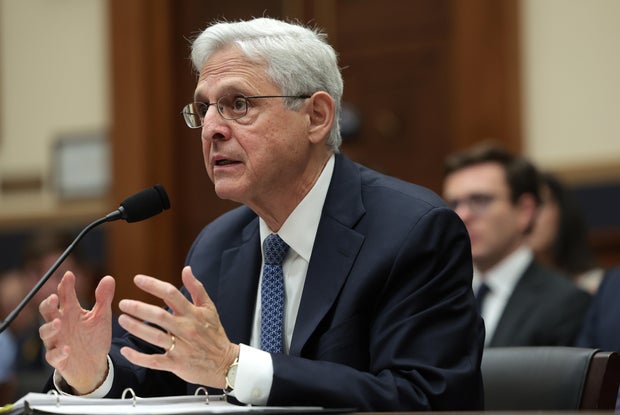Washington — Two Republican-led House committees are set to consider a contempt of Congress resolution against Attorney General Merrick Garland on Thursday for defying their request for audio recordings from the classified documents case against President Biden.
The Judiciary and Oversight committees are moving forward with the markups after the Justice Department declined to turn over an audio recording of former special counsel Robert Hur’s October 2023 interview with the president, which came as part of his investigation into Mr. Biden’s handling of classified documents.
Hur wrapped the year-long investigation months ago, releasing a highly anticipated report in February. While Hur’s report ultimately vindicated the president, it included some highly critical conclusions. The committees subpoenaed the Justice Department for the audio recording and other materials from the probe.
The Justice Department provided the transcripts to Congress and wrote in a letter to the committee chairmen last month that it had not identified an “investigative purpose” for handing over the audio. Assistant Attorney General Carolos Uriarte said in the letter that the Justice Department was “concerned” that the request for the recording was intended to “serve political purposes that should have no role in the treatment of law enforcement files.” And he noted that it could create a “chilling” effect on future investigations as well.
But the committee leaders pressed forward, arguing that the audio recordings “are important to our investigation of President Biden’s willful retention of classified documents and his fitness to be President of the United States.”
“There must be consequences for refusing to comply with lawful congressional subpoenas and we will move to hold Attorney General Garland in contempt of Congress,” Oversight Committee Chairman James Comer, a Kentucky Republican, said in a statement.
Reports from the committees detailed how they subpoenaed the audio recording and other records in part to determine whether “sufficient grounds exist to draft articles of impeachment against President Biden,” arguing that the subpoenas issued to the Justice Department are part of the House’s impeachment inquiry.
“The Department has invoked no constitutional or legal privilege to support withholding this material,” the reports said. “Its failure to fully comply with the Committees’ subpoenas has hindered the House’s ability to adequately conduct oversight over Special Counsel Hur regarding his investigative findings and the President’s retention and disclosure of classified materials and impeded the Committees’ impeachment inquiry.”
The reports argued that the audio recordings of the interview are of “superior evidentiary value,” saying the transcripts “do not reflect important verbal context, such as tone or tenor, or nonverbal context, such as pauses or pace of delivery.”
With the back-to-back markups on Thursday, the committees are set to vote to kickstart proceedings to hold Garland in contempt of Congress, a major escalation in the back and forth so far. Should the issue advance out of the committees, it would be brought before the full House.
The resolution instructs House Speaker Mike Johnson to certify that Garland defied the subpoena and refer the matter to the U.S. attorney in Washington for possible prosecution, which would be highly unlikely.
If the GOP-controlled chamber votes to hold Garland in contempt, he would be the latest in a short list of Cabinet members who have faced the same fate. In 2012, former Attorney General Eric Holder was held in contempt, as was former attorney general Bill Barr in 2019. But neither faced criminal charges from their own Justice Departments.
The Hur report
In a 345-page report released in February, Hur outlined Mr. Biden’s handling of classified documents that he kept in his possession following his time as vice president. The special counsel said that the president’s conduct posed “serious risks to national security,” but he determined that pursuing criminal charges was “not the proper remedy.” The evidence did not establish beyond a reasonable doubt that Mr. Biden violated the law, Hur ultimately concluded.
Even so, Hur’s report also included a series of observations about the president’s memory that became fodder for GOP opposition in the weeks after its release. Among the most damning was an allegation that Mr. Biden could not recall when his son, Beau Biden, died. The transcript of the interview showed that the president struggled to identify the year, but did correctly name the month and date.
Hur testified in March before the House Judiciary Committee, where he faced criticism from both sides of the aisle. At the time, Republicans argued the decision not to recommend charges against Mr. Biden was evidence of a two-tiered justice system, given the charges that Trump faces for allegedly retaining classified material. And Democrats criticized the former special counsel’s characterization of Mr. Biden’s memory as inaccurate and unnecessary.
When asked whether Congress should have access to the recordings, Hur said “it is not for me to weigh into what information Congress should or should not have.” He added that “the audio recordings were part of the evidence, of course, that I considered in coming to my conclusions.”

